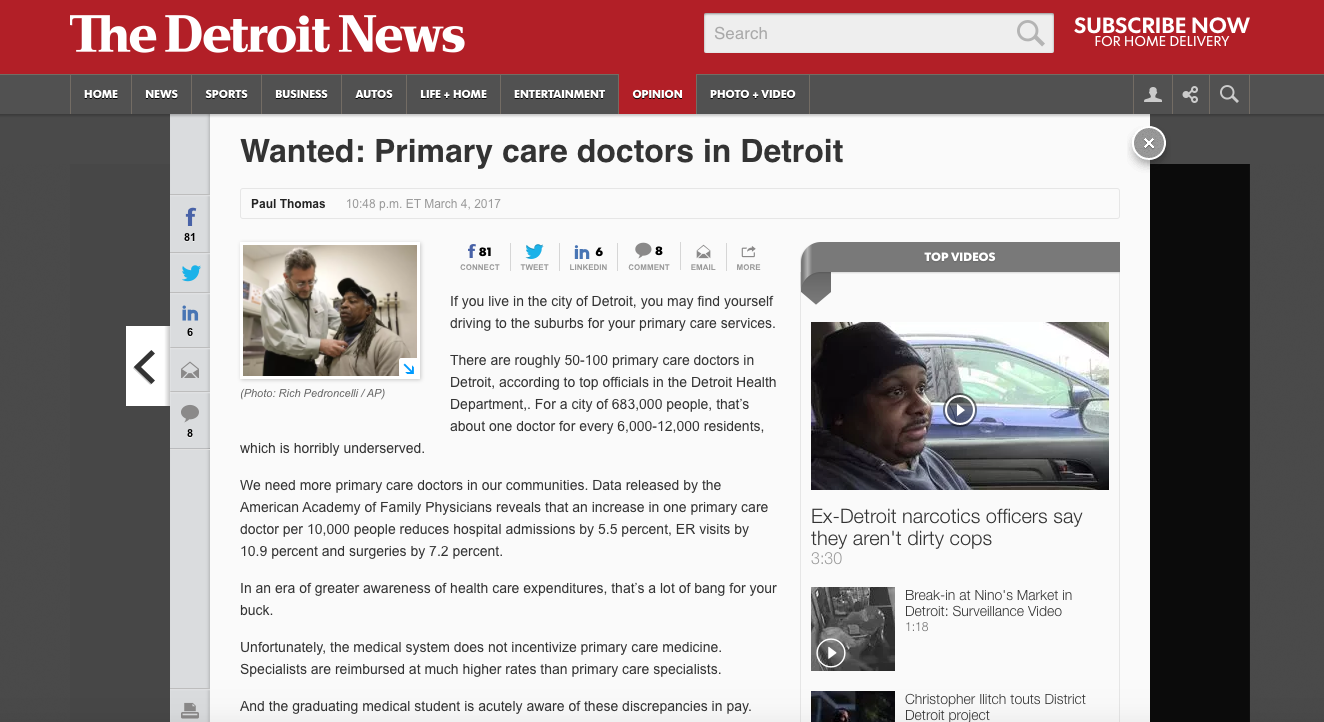Opinion Published in the Detroit News
This week I wrote an opinion piece and it was published by the Detroit News! I'm very excited about getting the word out about the benefits of Primary Care and the work that needs to be done to address the health disparities in our city and in our region. Here's the link. A sincere thank you to Ingrid Jacques for giving me the opportunity to write this.
There are always constraints, with time and with resources, and the article was edited to fit the allotted space in the Sunday paper. So, here is the essay that I wrote in its entirety prior to editing by the News:
If you live in the City of Detroit, you may find yourself driving to the suburbs for your primary care services.
According to top officials in the Detroit Health Department, there are roughly 50 – 100 primary care doctors in Detroit. For a city of 683,000 people, that’s about 1 doctor for every 6,000 – 12,000 residents, which is horribly underserved.
Interestingly, Wayne County as a whole has 1 primary care doctor for every 1,515 residents. But, the supply of doctors is not equitably distributed across communities within Wayne County. Areas like Grosse Pointe and Dearborn have a relative saturation, while cities like Inkster and Detroit remain underserved.
By contrast, Washtenaw County has 1 primary care doctor for every 598 residents and Oakland County has 1 primary care doc for every 655 residents. These are more equitable and desirable ratios.
We need more primary care doctors in our communities. Research has shown that as the number of primary care doctors increases, health outcomes improve and costs decrease.
Data released by the American Academy of Family Physicians reveals that an increase in one primary care doctor per 10,000 people reduces hospital admissions by 5.5%, ER visits by 10.9% and surgeries by 7.2%.
In an era of greater awareness of healthcare expenditures, that’s a lot of bang for your buck.
Unfortunately, the medical system does not incentivize primary care medicine. Specialists like Orthopedists, Cardiologists and Dermatologists are reimbursed at much higher rates than primary care specialists like Family Medicine doctors, General Internal Medicine doctors and Pediatricians.
And the graduating medical student is acutely aware of these discrepancies in pay. The median level of med school debt for the class of 2015 was $183,000 and the total cost may surpass $400,000 if paid over the long term with interest.
As the average student considers an average salary of $443,000 as an Orthopedist or $204,000 as a Pediatrician, choosing primary care medicine becomes economically strenuous.
And for those doctors who choose primary care specialties, primary care offices are often set up in more affluent neighborhoods where the reimbursement levels are higher. These location selection decisions are often out of the hands of individual doctors and dictated by corporate, profit-driven health systems.
This suburbanization of primary care medical services has had a terrible effect for Detroit’s residents. WalletHub recently ranked the City of Detroit as the least healthy major city in the United States, ranking 150 out of 150.
After the WalletHub list was published, the former Health Department Director was quoted in a Detroit News article: “Detroit health chief Dr. Abdul El-Sayed wasn’t surprised with the results, which he blamed partly on the lack of doctor’s offices in neighborhoods, healthy food stores, transportation and safe places to exercise.”
But, there is hope. The longstanding work of free and low cost clinics like CHASS, the Student Run Free Clinic, HUDA, and Joy-Southfield Clinics should be acknowledged. It is also encouraging that the Michigan State University of Osteopathic Medicine Popoff Clinic on Mack Avenue on the East Side is complimenting these stalwarts. Additionally, a Direct Primary Care service, Plum Health DPC, in Southwest Detroit/Corktown is providing another option for Detroit residents.
Finally, as Downtown, Midtown and New Center become more sustainable, primary care services should begin to take hold with potential spill over benefits for adjacent neighborhoods.
Paul Thomas, MD
Family Medicine Doctor with Plum Health DPC
Thank you for reading, and have a wonderful day,
- Paul Thomas, MD
A newspaper clipping from this Sunday's Detroit News about health care and health disparities in the city of Detroit and the potential solutions to address them.




